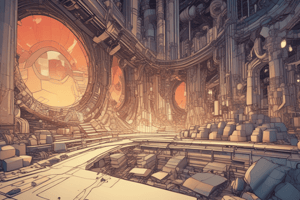Podcast
Questions and Answers
What is the purpose of the Supplementary Specification during the inception phase?
What is the purpose of the Supplementary Specification during the inception phase?
- To identify the key non-functional requirements impacting the architecture (correct)
- To list risks and their mitigation strategies
- To provide a glossary of domain terminology
- To describe the functional requirements in detail
Which type of requirement focuses on the technical design of the software system?
Which type of requirement focuses on the technical design of the software system?
- User requirements
- Design requirements (correct)
- Domain requirements
- System requirements
What do non-functional requirements in software systems focus on?
What do non-functional requirements in software systems focus on?
- Technical design aspects
- User tasks and workflows
- Characteristics essential for effective operation (correct)
- Specific functions and features
Which category of requirements includes information about operating systems and network protocols?
Which category of requirements includes information about operating systems and network protocols?
What is the main purpose of Use-Case Model during inception?
What is the main purpose of Use-Case Model during inception?
What is the purpose of a use case in Object-Oriented Analysis and Design (OOAD)?
What is the purpose of a use case in Object-Oriented Analysis and Design (OOAD)?
Which type of actor directly interacts with the software system to achieve their goals?
Which type of actor directly interacts with the software system to achieve their goals?
What does a use case name describe?
What does a use case name describe?
Which element of the Use Case Model defines how actors use a system to accomplish a specific objective?
Which element of the Use Case Model defines how actors use a system to accomplish a specific objective?
In Object-Oriented Analysis and Design, what are associations used for?
In Object-Oriented Analysis and Design, what are associations used for?
What is the main objective of the inception phase in Object-Oriented Analysis and Design (OOAD)?
What is the main objective of the inception phase in Object-Oriented Analysis and Design (OOAD)?
During the inception phase of OOAD, what does the project team do in the 'Identifying stakeholders' activity?
During the inception phase of OOAD, what does the project team do in the 'Identifying stakeholders' activity?
What does 'Defining the scope' involve in the inception phase of Object-Oriented Analysis and Design?
What does 'Defining the scope' involve in the inception phase of Object-Oriented Analysis and Design?
Which activity in the inception phase of OOAD involves conducting interviews and researching the industry?
Which activity in the inception phase of OOAD involves conducting interviews and researching the industry?
What is one of the activities carried out during the inception phase to establish the common vision for a project?
What is one of the activities carried out during the inception phase to establish the common vision for a project?
What does a merge node represent in an activity diagram?
What does a merge node represent in an activity diagram?
How are swimlanes used in activity diagrams?
How are swimlanes used in activity diagrams?
What is the function of a synchronization activity in an activity diagram?
What is the function of a synchronization activity in an activity diagram?
How are flow final nodes represented in an activity diagram?
How are flow final nodes represented in an activity diagram?
In an activity diagram, how are object nodes depicted?
In an activity diagram, how are object nodes depicted?
What do actors in a use case diagram represent?
What do actors in a use case diagram represent?
Which UML diagram component is used to group similar kinds of use cases?
Which UML diagram component is used to group similar kinds of use cases?
In an activity diagram, what do control flow arrows represent?
In an activity diagram, what do control flow arrows represent?
What do decision nodes in an activity diagram indicate?
What do decision nodes in an activity diagram indicate?
Why are use case diagrams important according to the text?
Why are use case diagrams important according to the text?
Flashcards are hidden until you start studying
Study Notes
Inception Phase in OOAD
- Inception is the first phase of Object-Oriented Analysis and Design (OOAD) methodology
- It involves gathering information and understanding the requirements for a new software project
- The main objective is to establish the scope of the project, identify stakeholders, and define initial requirements
- Activities in inception phase:
- Identifying the problem
- Defining the scope
- Identifying stakeholders
- Establishing project goals and objectives
- Creating the initial requirements
Artifacts in Inception
- Vision and Business Case: describes high-level goals and constraints, business case, and executive summary
- Use-Case Model: describes functional requirements
- Supplementary Specification: describes non-functional requirements
- Glossary: defines key domain terminology and data dictionary
- Risk List and Risk Management Plan: describes risks and ideas for mitigation
- Prototypes and Proof-of-Concepts: clarifies vision and validates technical ideas
- Iteration Plan: describes the first elaboration iteration
- Phase Plan and Software Development Plan: low-precision guess for elaboration phase duration and effort
Requirements in OOAD
- Requirements are high-level descriptions of a system's services, constraints, or detailed specifications
- Types of requirements:
- Functional requirements: describe specific functions and features of the software system
- Non-functional requirements: specify characteristics of the software system not related to functionality
- Other types of requirements:
- User requirements: describe the needs and expectations of end-users
- System requirements: describe hardware and software infrastructure needed for the software system
- Design requirements: describe technical design of the software system
- Domain requirements: specific to a particular category or domain of projects
Use Cases and Use Case Model
- A use case represents a sequence of actions that the system performs in response to an external event to achieve a specific goal or objective
- Use Case Model:
- Defines how users interact with the system to achieve specific objectives
- Consists of actors, use cases, and associations between them
- Uses a hierarchical structure to organize use cases based on level of abstraction
- Components of Basic Model:
- Actors: people or external systems that interact with the software system
- Use Cases: define how actors use the system to achieve specific objectives
- Associations: define relationships between actors and use cases
Use Case Diagram
- A graphical representation of the use case model
- Components:
- Actors: stick figures representing users
- Use Cases: horizontally shaped ovals representing functionality
- Associations: lines between actors and use cases
- System Boundary Boxes: boxes that set the system scope for use cases
- Packages: group similar types of use cases
Activity Diagram
- A visual representation of a series of actions or flow of control in a system
- Often used in business process modeling
- Can describe the steps in a use case diagram
- Symbols:
- Activity nodes: rounded rectangles representing actions
- Control flow arrows: connecting activity nodes
- Decision nodes: diamonds indicating branching points
- Guards: conditions for flows
- Merge nodes: combine multiple flows into one
Studying That Suits You
Use AI to generate personalized quizzes and flashcards to suit your learning preferences.





